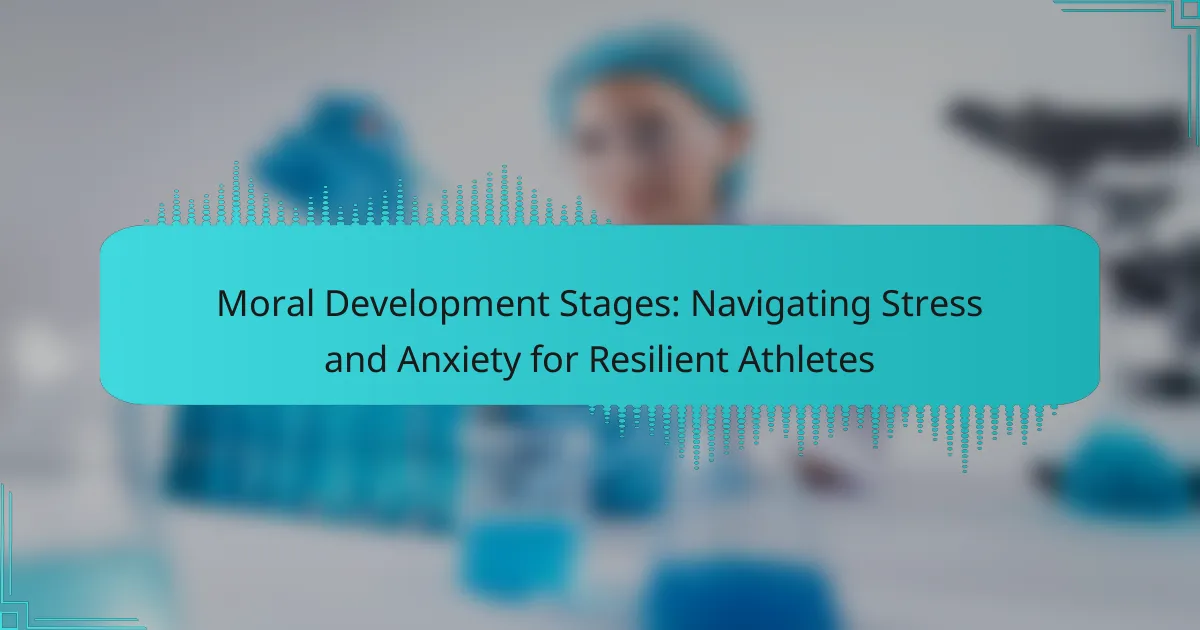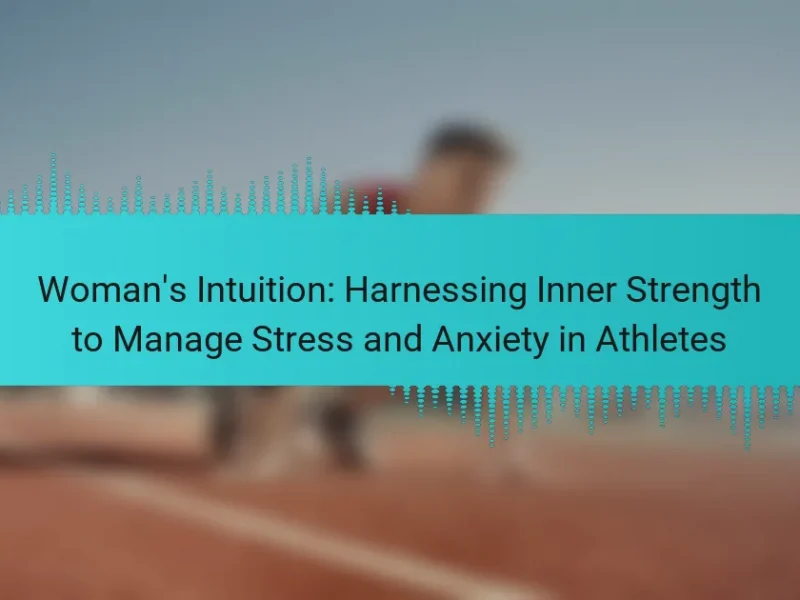Athletes often face significant stress and anxiety, impacting their performance and moral development. This article explores the three stages of moral development: pre-conventional, conventional, and post-conventional. It examines how these stages affect ethical decision-making and emotional resilience. Additionally, it highlights effective strategies like mindfulness, goal-setting, and social support to help athletes navigate challenges and enhance their mental health.
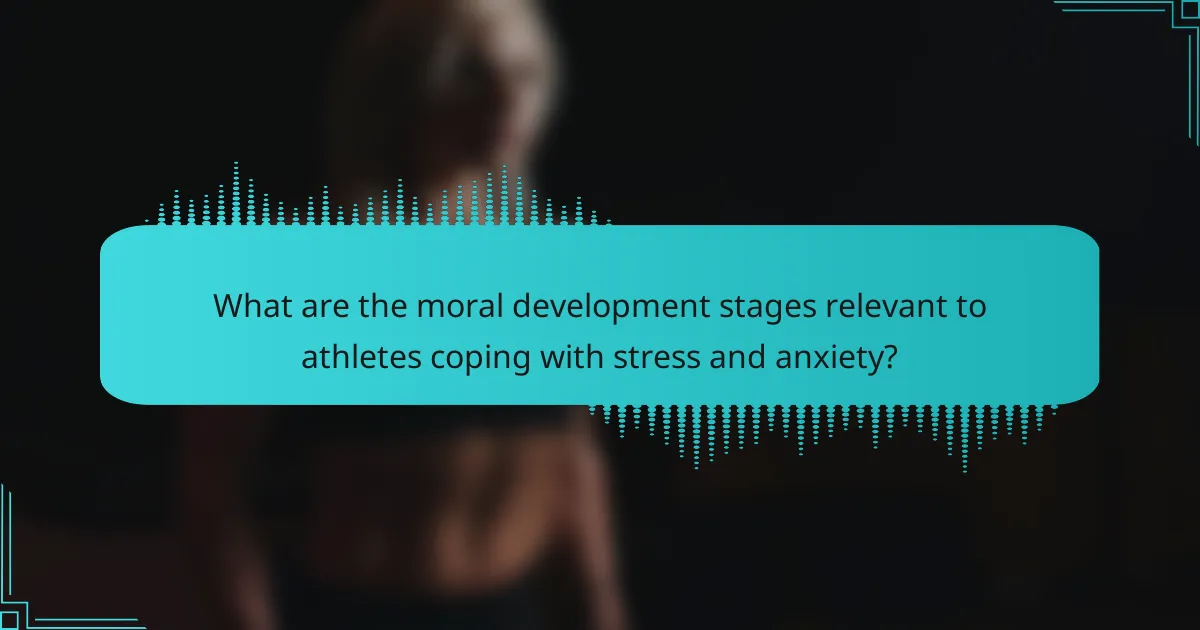
What are the moral development stages relevant to athletes coping with stress and anxiety?
Moral development stages relevant to athletes coping with stress and anxiety include pre-conventional, conventional, and post-conventional stages. These stages influence how athletes perceive ethical dilemmas and manage emotional challenges.
In the pre-conventional stage, athletes focus on self-interest and avoiding punishment. They may struggle with anxiety, as their decisions are often driven by immediate outcomes. In the conventional stage, athletes begin to adhere to team norms and societal expectations, which can help reduce stress through a sense of belonging. Finally, in the post-conventional stage, athletes develop a personal moral compass, enabling them to cope with stress and anxiety more effectively by aligning their actions with their values.
Understanding these stages allows coaches and sports psychologists to tailor support strategies, enhancing resilience and performance under pressure.
How do these stages influence emotional resilience?
Moral development stages significantly influence emotional resilience by shaping athletes’ responses to stress and anxiety. Each stage fosters critical thinking, empathy, and ethical decision-making, which are essential for managing pressure. As athletes progress through these stages, they develop a deeper understanding of their emotions and the motivations behind their actions. This self-awareness enhances their ability to cope with challenges, ultimately leading to improved resilience in competitive environments. For example, athletes who recognize the value of teamwork and support systems are better equipped to handle setbacks and maintain focus.
What role does self-awareness play in stress management?
Self-awareness is crucial in managing stress as it allows individuals to recognize their emotional triggers. Understanding these triggers enables athletes to implement effective coping strategies. Improved self-awareness leads to better emotional regulation, reducing anxiety and enhancing performance. By identifying stressors, athletes can develop resilience and adaptability, key attributes for success in high-pressure situations.
How can athletes develop self-awareness through reflection?
Athletes can develop self-awareness through reflection by regularly assessing their thoughts and emotions. This process helps them understand their responses to stress and anxiety, promoting moral development. Engaging in reflective practices, such as journaling or mindfulness, allows athletes to identify triggers and coping mechanisms. As a result, they can navigate challenges more effectively, enhancing resilience and performance. Regular reflection fosters a deeper understanding of personal values and ethical decision-making, crucial for moral development in sports.
What techniques enhance emotional intelligence in sports?
Developing emotional intelligence in sports involves techniques like self-awareness, empathy, and stress management. These skills enhance athletes’ resilience and performance under pressure.
Practicing mindfulness helps athletes recognize their emotions and reactions. This awareness allows for better decision-making during competitions. Additionally, emotional regulation techniques, such as deep breathing and visualization, can reduce anxiety and enhance focus.
Team-building exercises foster empathy among athletes. Understanding teammates’ perspectives strengthens communication and collaboration, essential for team success.
Regular feedback sessions promote moral development. Constructive criticism helps athletes learn from experiences, building resilience and emotional intelligence over time.
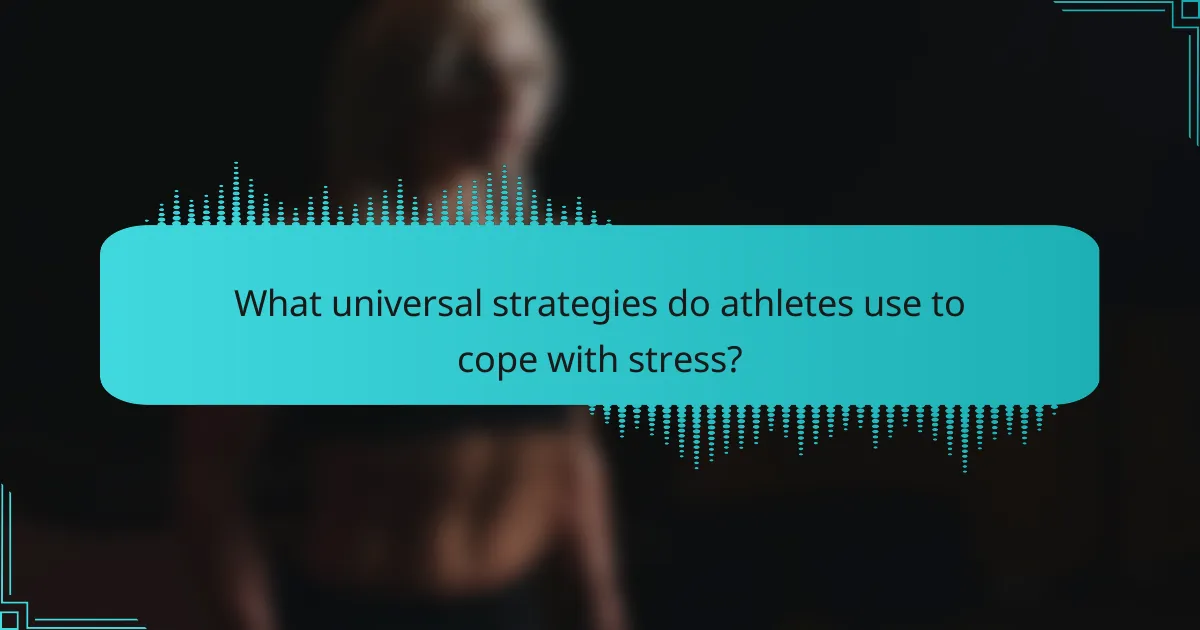
What universal strategies do athletes use to cope with stress?
Athletes utilize universal strategies such as mindfulness, goal-setting, and social support to manage stress effectively. Mindfulness practices enhance focus and reduce anxiety, while clear goal-setting provides direction and motivation. Social support from teammates and coaches fosters resilience and emotional well-being. These strategies contribute to moral development stages, enabling athletes to navigate stress and anxiety for improved performance.
How does physical training impact mental resilience?
Physical training enhances mental resilience by improving stress management and reducing anxiety levels. Regular physical activity boosts endorphin production, which contributes to a positive mood and mental clarity.
Engaging in structured training programs helps athletes develop coping strategies for stress. For instance, exposure to challenging situations during training fosters adaptability and emotional regulation.
Research indicates that athletes who participate in rigorous training display greater resilience in high-pressure environments. This unique attribute of physical training supports mental toughness, allowing athletes to face adversity with confidence.
Overall, the interplay between physical training and mental resilience is crucial for athletes navigating stress and anxiety, promoting a holistic approach to performance enhancement.
What are common coping mechanisms among athletes?
Athletes commonly use coping mechanisms like mindfulness, visualization, and social support to manage stress and anxiety. These strategies enhance their moral development and resilience. Mindfulness helps athletes stay present, while visualization aids in performance preparation. Social support fosters a sense of belonging and reduces feelings of isolation. Engaging in these practices leads to improved mental well-being and athletic performance.

What unique challenges do athletes face regarding anxiety?
Athletes face unique challenges regarding anxiety, including performance pressure, public scrutiny, and the mental toll of injuries. These factors can hinder moral development stages, impacting resilience. Performance anxiety can lead to decreased focus and motivation, while public scrutiny adds stress that affects decision-making. Additionally, coping with injuries can create a sense of loss and uncertainty, complicating mental health management. Addressing these challenges requires tailored strategies to foster resilience and support athletes’ moral growth.
How do performance expectations contribute to stress?
Performance expectations can significantly contribute to stress by creating pressure to achieve specific outcomes. Athletes often feel compelled to meet these expectations, leading to anxiety about performance. This stress can hinder their moral development stages, impacting resilience. High expectations may also result in fear of failure, which can further escalate stress levels. As a result, managing these expectations is crucial for maintaining mental well-being in athletes.
What is the impact of public scrutiny on athlete mental health?
Public scrutiny significantly impacts athlete mental health by increasing stress and anxiety levels. Athletes often face intense public expectations and criticism, which can lead to feelings of isolation and pressure. Research indicates that 35% of athletes experience mental health issues linked to public perception. This scrutiny can hinder their performance and overall well-being. Developing resilience through moral development stages helps athletes navigate these challenges effectively. Engaging in mental health support and fostering a positive environment can mitigate the negative effects of public scrutiny.
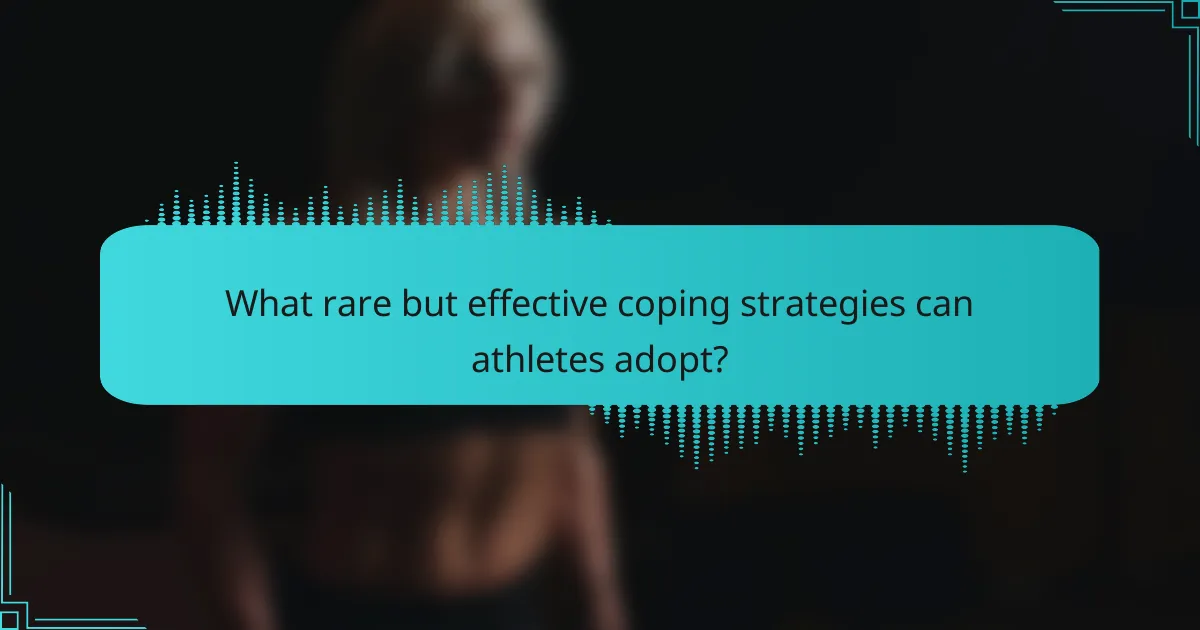
What rare but effective coping strategies can athletes adopt?
Athletes can adopt mindfulness techniques, visualization, and nature immersion as rare but effective coping strategies. Mindfulness enhances focus and reduces anxiety, while visualization helps in mental rehearsal for performance. Nature immersion promotes relaxation and mental clarity, fostering resilience.
How can athletes leverage mindfulness in high-pressure situations?
Athletes can leverage mindfulness in high-pressure situations by enhancing focus and reducing anxiety. Mindfulness practices, such as meditation and breathing exercises, help athletes stay present and manage stress effectively. These techniques foster resilience, allowing athletes to navigate challenges with greater clarity. Research indicates that regular mindfulness training can improve performance by promoting emotional regulation and mental toughness. Additionally, incorporating mindfulness into training routines cultivates a unique attribute of mental agility, essential for peak performance in competitive environments.
What unconventional methods have proven successful for elite athletes?
Elite athletes have found success through unconventional methods such as mindfulness, visualization, and unconventional training techniques. Mindfulness practices help manage stress and anxiety, enhancing focus during competitions. Visualization techniques enable athletes to mentally rehearse performances, building confidence. Unconventional training methods, like incorporating play or art, foster creativity and resilience, leading to improved performance outcomes. These approaches address the unique challenges athletes face, promoting moral development and emotional strength.

How can athletes build a support network to manage anxiety?
Athletes can build a support network to manage anxiety by connecting with coaches, teammates, and mental health professionals. Establishing open communication fosters trust and encourages sharing experiences. Participating in group activities enhances camaraderie and collective resilience. Seeking guidance from sports psychologists provides tailored coping strategies. Engaging in community support groups can also offer valuable perspectives and shared coping mechanisms.
What role do coaches play in an athlete’s mental health?
Coaches play a crucial role in an athlete’s mental health by providing support, guidance, and strategies to manage stress and anxiety. They help athletes navigate moral development stages, fostering resilience through positive reinforcement and constructive feedback. Coaches can identify signs of mental distress and implement tailored interventions, creating a safe environment for athletes to express their emotions. This proactive approach enhances athletes’ coping mechanisms, ultimately leading to improved performance and well-being.
How can teammates support each other during stressful times?
Teammates can support each other during stressful times by fostering open communication and providing emotional encouragement. They can share coping strategies, engage in team-building activities, and create a supportive environment that promotes resilience. Regular check-ins can help teammates express their feelings and collectively navigate challenges. Encouraging a culture of empathy enhances moral development and strengthens team bonds.
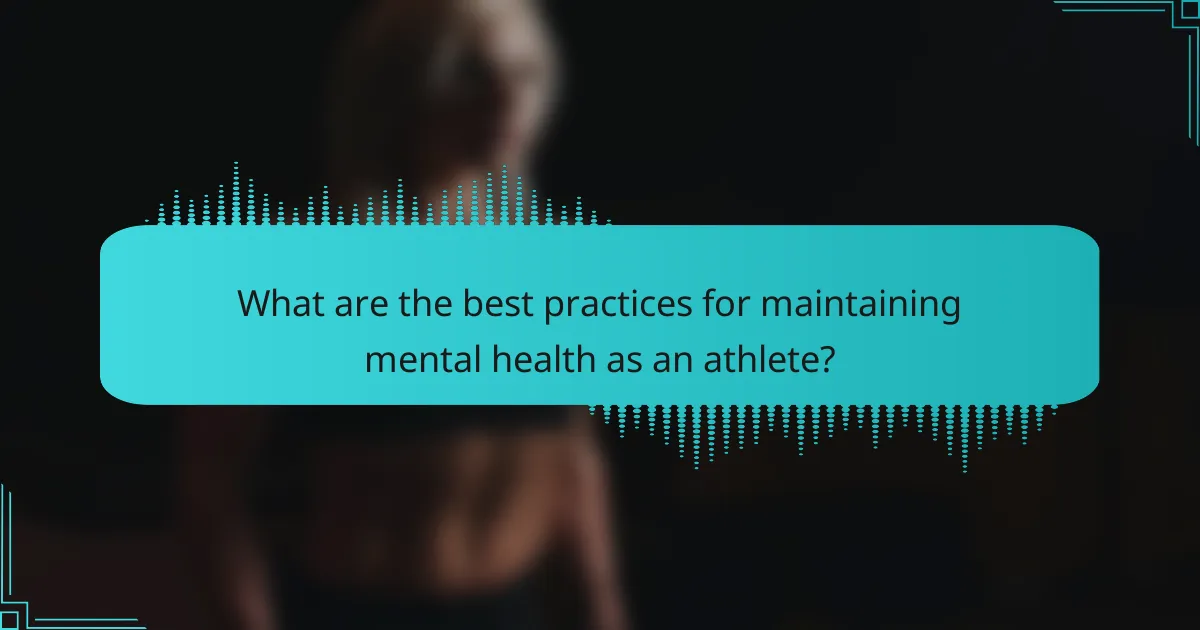
What are the best practices for maintaining mental health as an athlete?
To maintain mental health as an athlete, prioritize self-awareness, establish a support network, and practice stress management techniques. These strategies enhance resilience and reduce anxiety during competition.
Self-awareness involves recognizing personal stress triggers and emotional responses, enabling proactive coping strategies. Building a support network of coaches, teammates, and mental health professionals fosters a sense of belonging and shared experience. Stress management techniques, such as mindfulness and relaxation exercises, equip athletes to handle pressure effectively.
Incorporating these practices consistently can lead to improved performance and overall well-being.
What daily habits can enhance an athlete’s resilience?
Daily habits that enhance an athlete’s resilience include consistent mental training, effective stress management techniques, and maintaining a positive mindset. These practices help athletes navigate stress and anxiety effectively.
Engaging in mindfulness exercises, such as meditation or deep-breathing techniques, can significantly reduce anxiety levels. Research shows that athletes who practice mindfulness report improved focus and emotional regulation.
Establishing a structured routine fosters discipline and predictability, which are vital for resilience. Athletes benefit from setting specific goals and tracking their progress, reinforcing their commitment to personal development.
Building a strong support network of coaches, teammates, and mental health professionals provides emotional resources. This support enhances an athlete’s ability to cope with challenges, promoting long-term resilience.
What are common mistakes athletes make in managing stress?
Athletes often make critical mistakes in managing stress, impacting their performance. Common errors include neglecting mental health, failing to establish effective coping strategies, and underestimating the importance of rest and recovery. Additionally, many athletes do not seek support from coaches or mental health professionals, leading to increased anxiety and decreased resilience. Recognizing and addressing these mistakes can foster moral development and enhance overall athletic performance.
How can athletes optimize their mental health strategies for peak performance?
Athletes can optimize their mental health strategies by focusing on moral development stages to manage stress and anxiety. Implementing self-reflection practices enhances resilience, enabling athletes to navigate challenges effectively. Engaging in mindfulness techniques fosters emotional regulation, promoting a positive mindset. Establishing a support network provides essential encouragement and accountability, crucial for maintaining mental well-being during competitive pressures. Prioritizing mental health alongside physical training creates a holistic approach that supports peak performance.
